|
|
|
Sort Order |
|
|
|
Items / Page
|
|
|
|
|
|
|
| Srl | Item |
| 1 |
ID:
125600
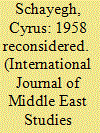

|
|
|
|
|
| Publication |
2013.
|
| Summary/Abstract |
Using Arabic, English, and French sources, and engaging Middle East and Cold War historians, this article makes a threefold argument. First, in United Arab Republic (UAR)-Syria, Jordan, and Lebanon, the 1958-59 explosion of domestic and regional tensions triggered state-formation surges. Second, these formed one process, which made those states more alike, with state-led socioeconomic planning playing a key role. Third, that process partook of a global Third World trend intersecting with the early Cold War. I draw three conclusions. Although existing scholarly readings that the events of 1958-59 in the Arab Middle East formed a crisis but not an ideological or political watershed are correct, from the viewpoint of state formation this crisis was a milestone. Moreover, UAR-Syria, Jordan, and Lebanon had persisting affinities and shared regional positions-notably, the fact that all were sandwiched between the unstable poles of the Arab state system, Iraq and Egypt-that shaped their individual postindependence histories of state formation. Last, Washington's low-profile involvement in this state-formation surge illustrates how domestic sociopolitics and regional geopolitics-including the UAR's peaking popularity and influence in 1958-59-affected U.S. policy in the Cold War postcolonial world.
|
|
|
|
|
|
|
|
|
|
|
|
|
|
|
|
| 2 |
ID:
115084
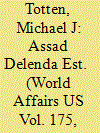

|
|
|
|
|
| Publication |
2012.
|
| Summary/Abstract |
Syria's tyrant Bashar al-Assad is in the middle of a life-or-death struggle. He might be overthrown. He should be.
The Arab Socialist Baath Party regime, beginning with its founder Hafez al-Assad and continuing through the rule of his son Bashar, is the deadliest state sponsor of terrorism in the Arab Middle East. It assisted the bloodthirsty insurgency in Iraq that killed American soldiers by the thousands and murdered Iraqi civilians by the tens of thousands. It has used both terrorism and conventional military power to place Lebanon under its boot since the mid-1970s. It made Syria into the logistics hub for Hezbollah, the best-equipped and most lethal non-state armed force in the world. It has waged a terrorist war against Israel and the peace process for decades, not only from Lebanon, but also from the West Bank and Gaza. And it is Iran's sole Arab ally and its bridge to the Mediterranean.
|
|
|
|
|
|
|
|
|
|
|
|
|
|
|
|
| 3 |
ID:
158451
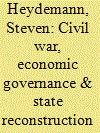

|
|
|
|
|
| Summary/Abstract |
Civil wars currently underway in Libya, Syria, and Yemen demonstrate that patterns of economic governance during violent conflict exhibit significant continuity with prewar practices, raising important questions along three lines. First, violent conflict may disrupt prewar practices less than is often assumed. Second, continuity in governance highlights the limits of state fragility frameworks for postconflict reconstruction that view violent conflict as creating space for institutional reform. Third, continuity of prewar governance practices has important implications for the relationship between sovereignty, governance, and conflict resolution. Civil wars in the Middle East have not created conditions conducive to reconceptualizing sovereignty or decoupling sovereignty and governance. Rather, parties to conflict compete to capture and monopolize the benefits that flow from international recognition. Under these conditions, civil wars in the Middle East will not yield easily to negotiated solutions. Moreover, to the extent that wartime economic orders reflect deeply institutionalized norms and practices, postconflict conditions will limit possibilities for interventions defined in terms of overcoming state fragility.
|
|
|
|
|
|
|
|
|
|
|
|
|
|
|
|
| 4 |
ID:
085384
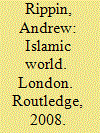

|
|
|
|
|
| Publication |
London, Routledge, 2008.
|
| Description |
xx, 678p.Hbk
|
| Standard Number |
0415364078
|
|
|
|
|
|
|
|
|
|
|
|
Copies: C:1/I:0,R:0,Q:0
Circulation
| Accession# | Call# | Current Location | Status | Policy | Location |
| 054021 | 909.097671/RIP 054021 | Main | On Shelf | General | |
|
|
|
|
| 5 |
ID:
169444
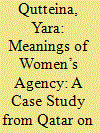

|
|
|
|
|
| Summary/Abstract |
The measurement of women’s agency poses numerous challenges, including multi-dimensionality and context-specificity. This challenge is especially large for non-Western contexts that adapt measurement instruments without rigorous testing and comprehensive understanding of construct meanings in place. In this paper, we present a case study from Qatar where we investigate the face validity, comprehension and functionality of women’s agency scale items. Cognitive interviews were conducted with twenty-four women to capture their interpretations of decision-making, freedom-of-movement, and gender attitudes scale items. The majority of women originally reported that they made their own decisions; yet, further probing revealed otherwise. While women seemed to understand, as intended, the freedom-of-movement item, the items measuring gender attitudes were generally reflective of broader local societal norms rather than the women’s own opinions. This research highlights the need for deeper exploration into women’s understanding of an agency scale before its use in a new context.
|
|
|
|
|
|
|
|
|
|
|
|
|
|
|
|
| 6 |
ID:
132092
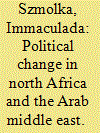

|
|
|
| 7 |
ID:
185569
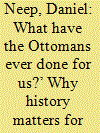

|
|
|
|
|
| Summary/Abstract |
Scholars of Middle East politics have been reluctant to explore how the long nineteenth century has shaped the region's political development. The reason for this neglect, I argue, is a common understanding of Ottoman decline and failed modernization, which suggests that the story of modern politics in the Middle East commences with colonial partition after the First World War. But what if political scientists are getting the story wrong? In this article, I argue that our background assumptions about the political development of the Middle East reflect outdated understandings that historians themselves have long left behind. Drawing on this revisionist Ottoman historiography, I show that key dynamics in Middle East politics today—such as state-building and sectarian identities—originate not in the era ushered in by the Sykes–Picot Accord, but in the transformations of the long nineteenth century. By overlooking the evolution of late Ottoman politics and their historical legacies, political scientists risk misdiagnosing key dynamics in the region's political development. ‘Bringing the Ottomans back in’ highlights to policy-makers the importance of the extra-institutional dimensions of statebuilding in the Middle East, and opens up new vistas for research in comparative–historical political science.
|
|
|
|
|
|
|
|
|
|
|
|
|
|
|
|
|
|
|
|
|